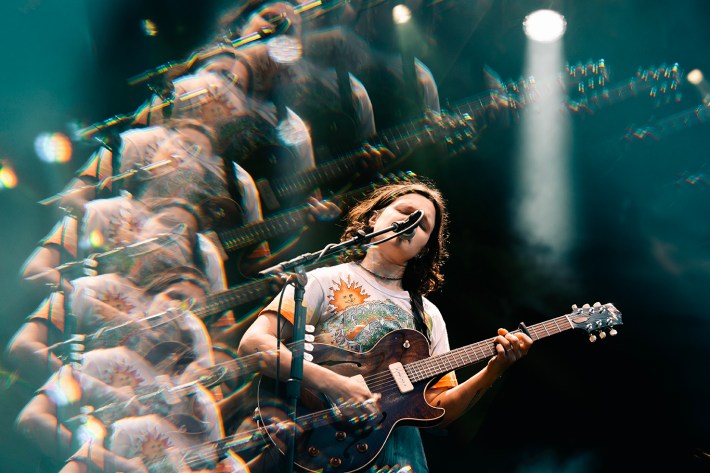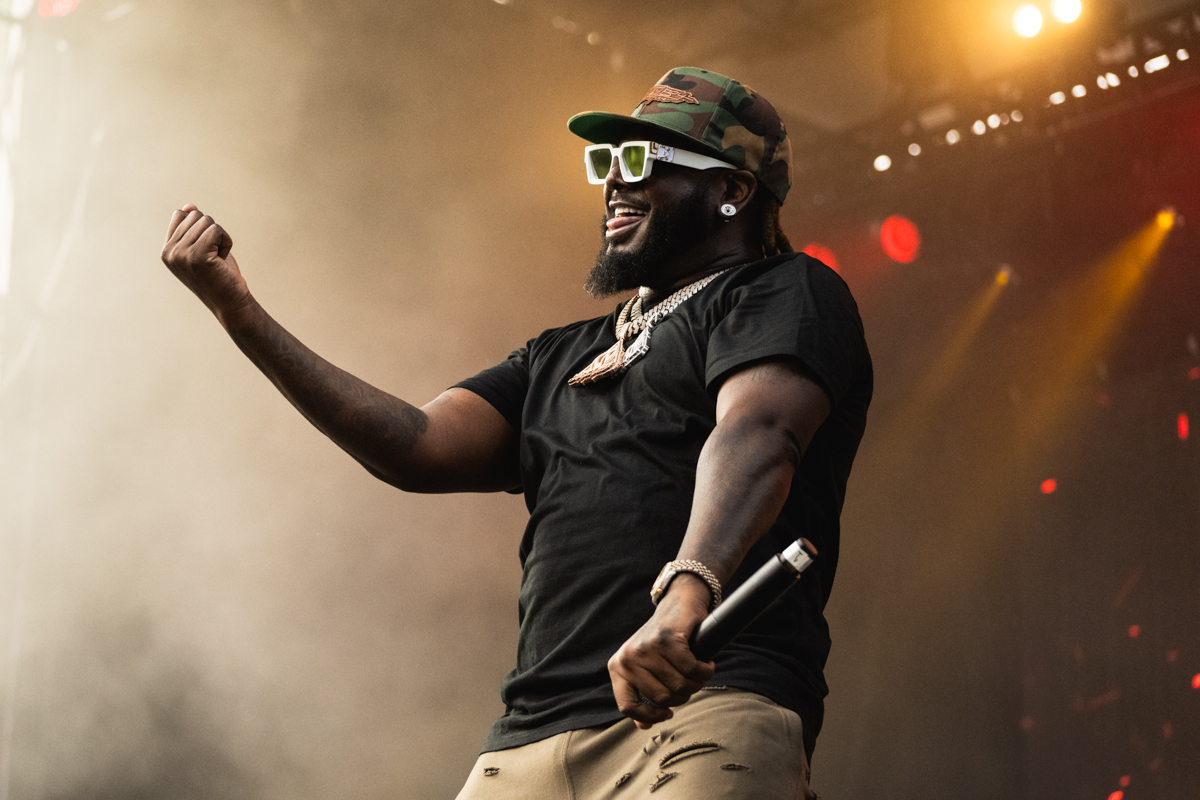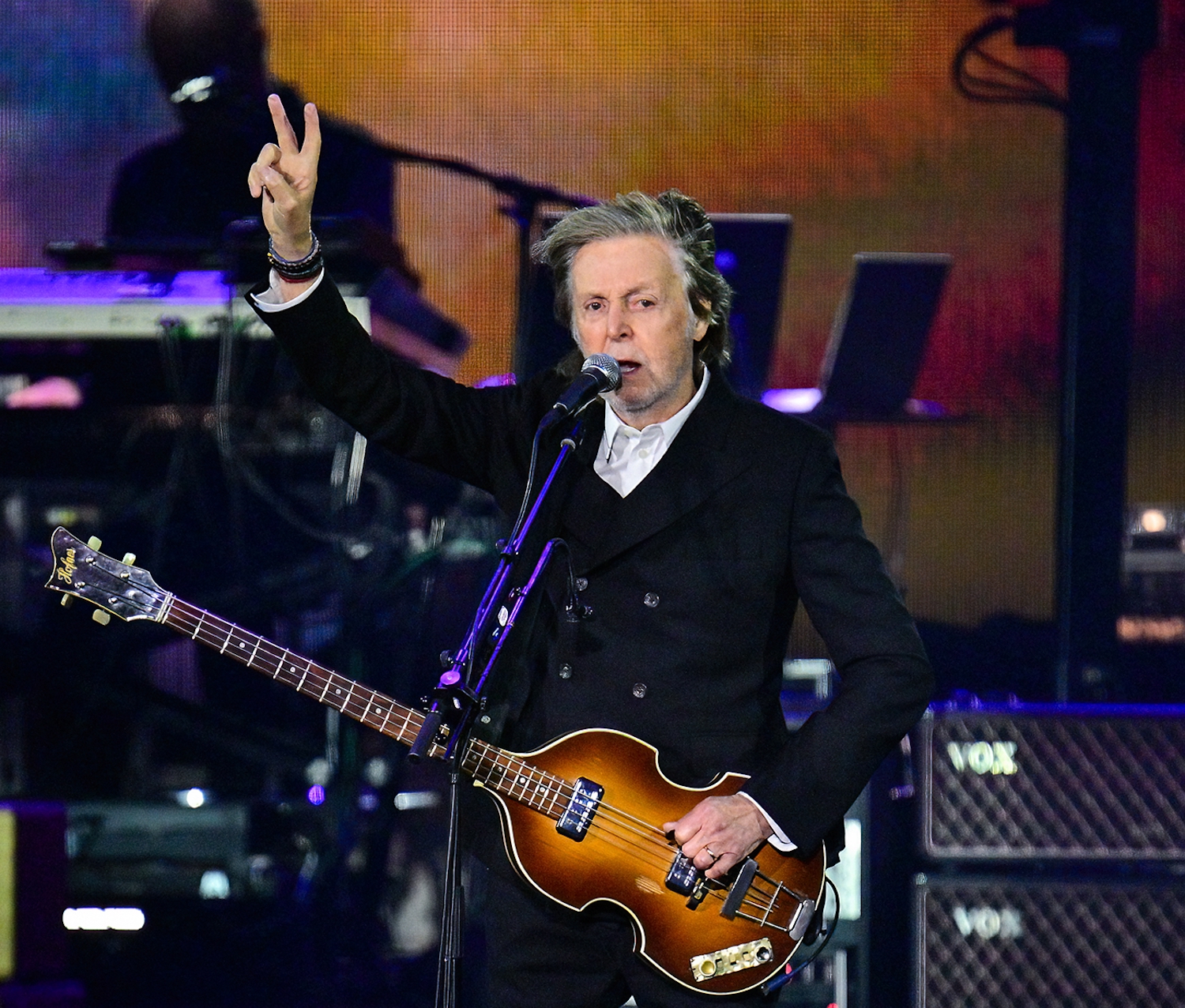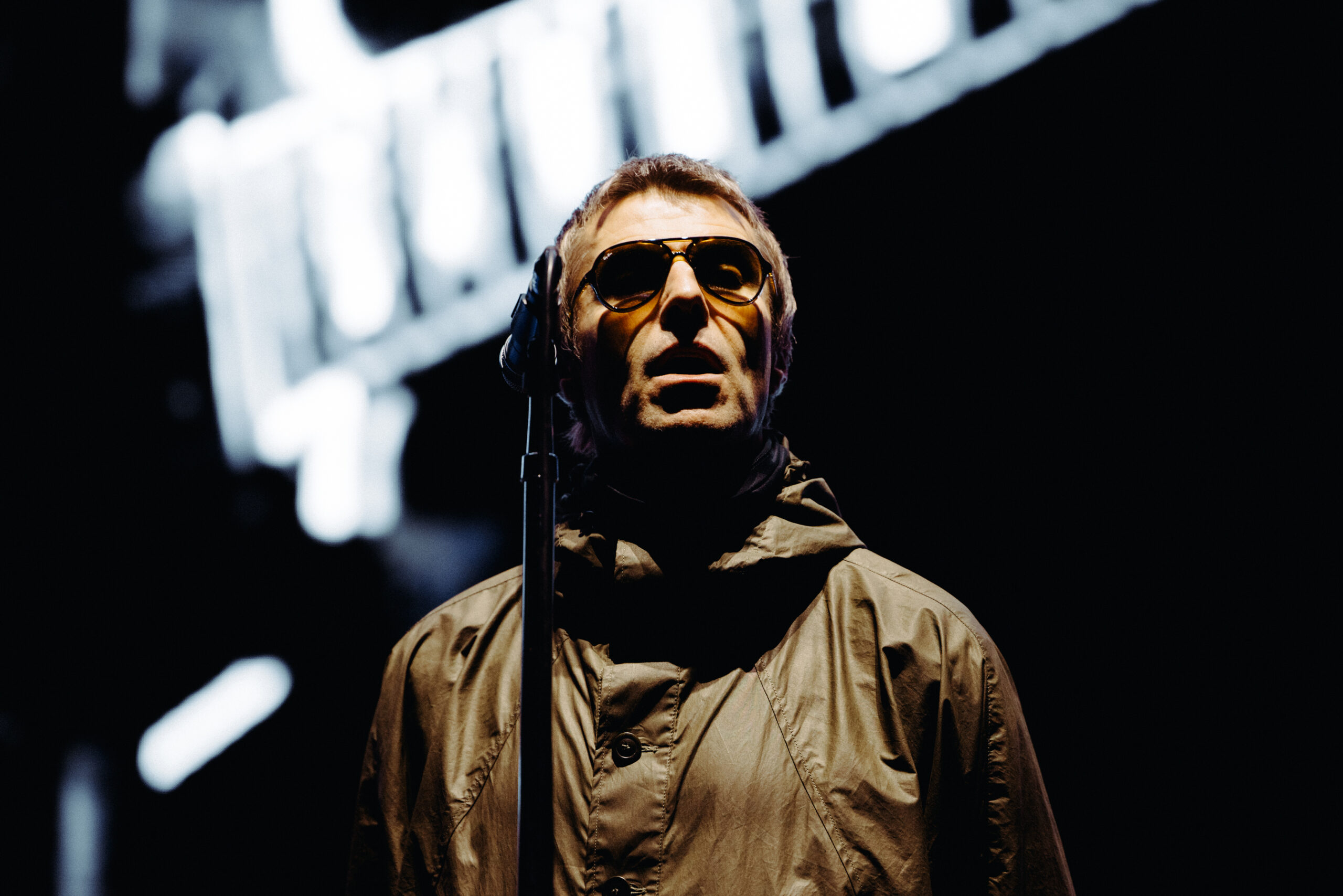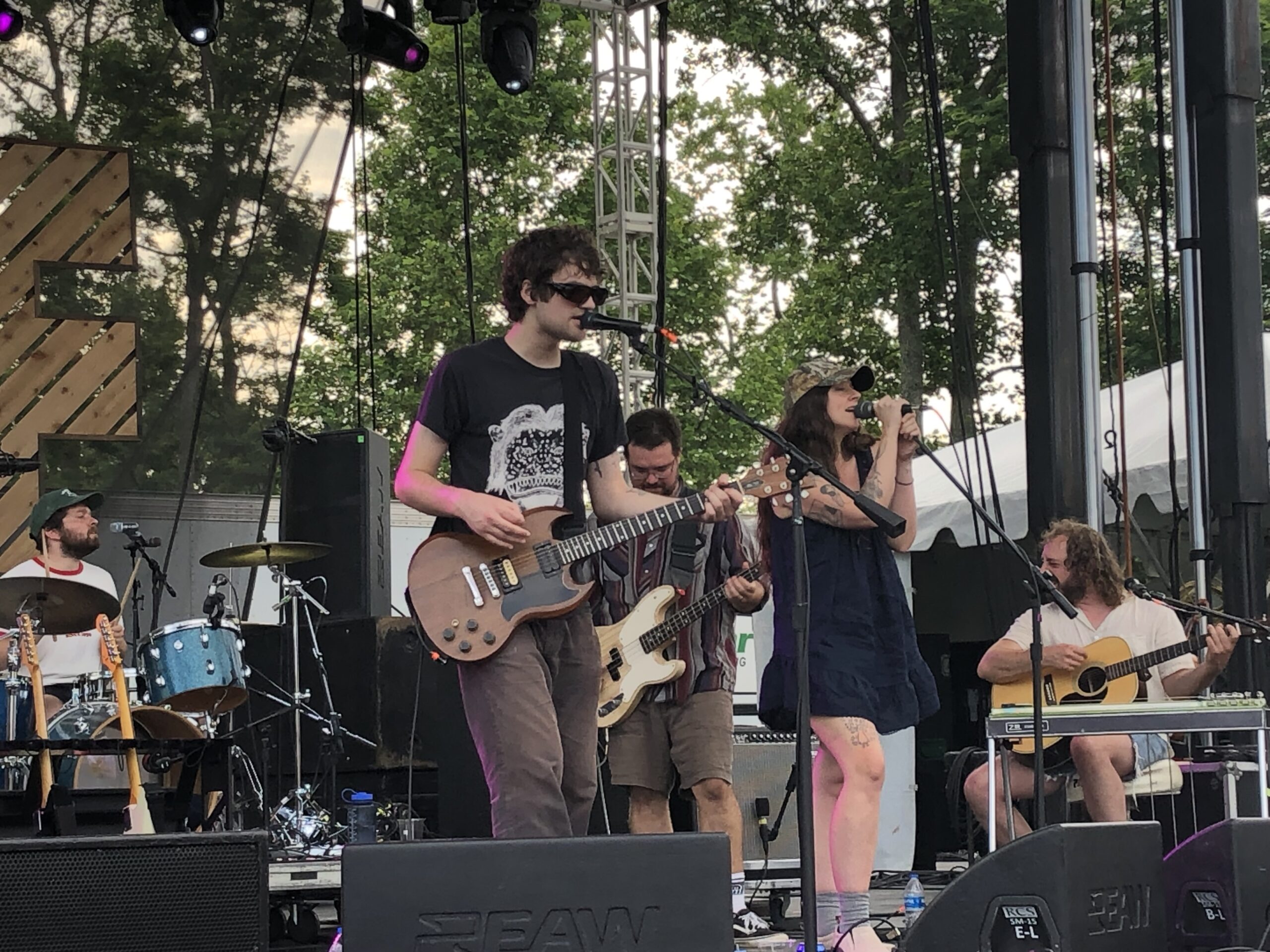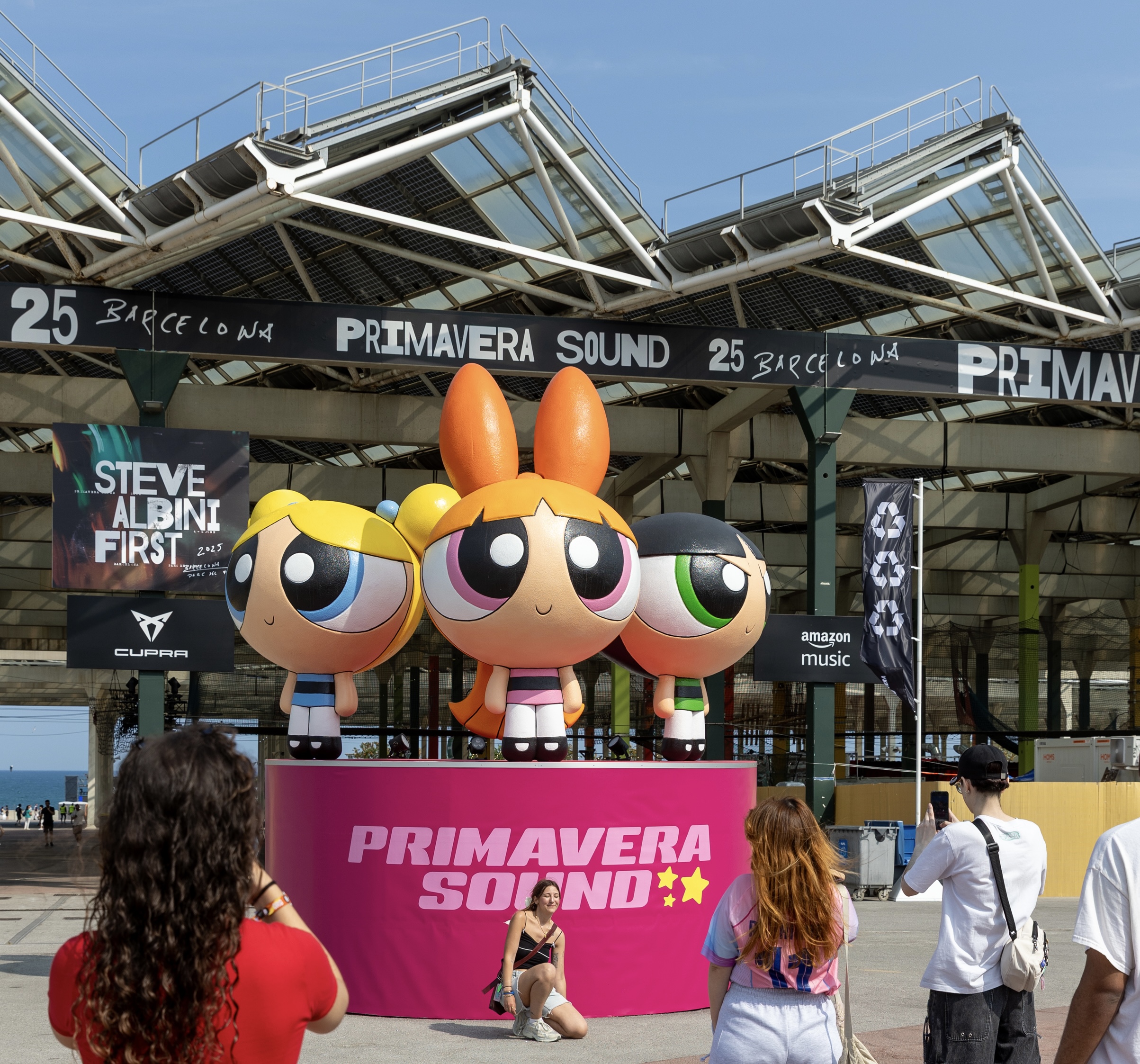Like much of downtown Portland, Project Pabst shuttered abruptly as the realities of COVID set in. Project Pabst launched as a fall festival in September 2014 before shifting to July in 2015. It remained a summer festival for the duration of its run, which was shorter than anyone anticipated. After expanding to Denver, Philadelphia, and Atlanta in 2017, the festival vanished, and a return to the old Portland-only format was planned for 2020.
This, obviously, did not happen.
Thankfully, neither downtown nor Project Pabst seem content to stay dead. Project Pabst returned this year, with Stereogum as a media partner. As someone who also attended the last one in Portland in 2017, it seems that enthusiasm for our own local festival has not dimmed.
Pickathon in nearby Happy Valley, OR is the closest festival of note to Portland; it specializes in indie rock and folk with a heavy emphasis on the latter. Pretty much everything else in the state leans further into folk, jam bands, or your standard rock radio nostalgia circuits. Most of the musicians I'd want to see (indie rock, punk and hardcore, rap, etc.) don't come any closer than Boise's Treefort festival. So having a festival of notable names a short bus ride from my home, an event I can attend while still sleeping in my own bed, is something I looked forward to.
Project Pabst was one of the first things I ever did after moving to Portland. My wife and I had moved across the country so she could attend grad school. We knew almost nobody. Neither of us had a job yet. Our bed was a mattress on the floor, our TV was a laptop constantly playing Game Of Thrones, and we were living out of scattered boxes when I, on a whim, called into a radio contest and won tickets to Project Pabst 2017. The lineup was a fever dream:Iggy Pop, Beck, Nas, Father John Misty, Spoon, Die Antwoord, and Lizzo, whose only breakout song at the time was "Good As Hell."
Returning to Tom McCall Waterfront Park this year was a full loop back to when I was brand new to the city, and had me reflecting on what I love about Portland, about why I'm still here. The city is full of distinct little pockets, neighborhoods that develop their own culture and identity outside of the Eater lists of best new restaurants or 15 happy hour patios to die for or whatever. Whatever polyamorous-witch-coffee-shop stereotypes you can slap on the city (shit that is inescapable in any major city at this point), there's infinitely more actual interesting and fun things happening. The kids have revived screamo basement shows, shuttered strip clubs are being turned into DIY venues, the food scene actually kicks ass, new theaters are opening up, and the existing ones continue to expand their amount of exciting reissues, restored film, and rare and unique movies. In my experience over the last few years (and I travel a fair bit), I am more likely to have an interesting conversation with a stranger at a bar here than I am anywhere else in the US.
Above everything, though, I love an Oregon summer. The sun comes up before 6AM and doesn't set until almost 10PM. The day stays cool until noon and then stays warm late into the evening. It feels like you can fit two days into one, and a three day weekend feels like an actual vacation. Making Project Pabst a summer festival was the best thing the organizers ever did for it.
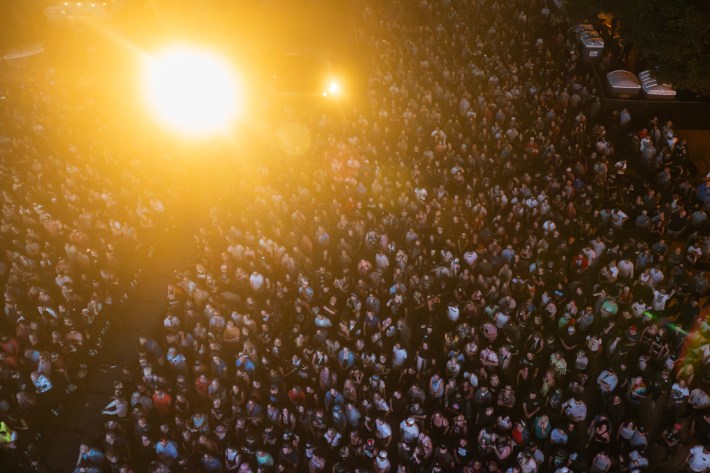
Day 1
I arrive at Project Pabst on Saturday at 12:30, worried that I'm running late for one of my most anticipated sets of the day: Alien Boy, who start the day off at 12:45. Will Call turns out to be a breeze, and I'm inside with my pass in minutes.
The festival is laid out almost exactly like it was in 2017. The north and south ends of the park are anchored by two basically identical stages: the Unicorn Stage and the Captain Pabst Stage, respectively. In between, the west side is lined with food trucks and a handful of retailers, while the east side along the Willamette River is taken up primarily by two port-a-potty pods, an indoor and an outdoor bar, and the medical tent. A 10- or 12-foot unicorn statue sits in the exact center of the field, which serves as a photo opp for people as they come through the gates.
Alien Boy are playing the Unicorn Stage, and from a distance I can already see their backdrop. On the screen behind the band, there is a looping montage of dirt bikes, monster trucks, demolition derbies, and people kissing, constantly intercut with the Alien Boy logo and the words "I BROKE MY WORLD."
Alien Boy are, in my opinion, the defining band of this era of Portland indie rock. Their 2021 album Don't Know What I Am embodied the band's tagline/mission statement, a phrase that often appears on their merch: "Dreams And Queer Feelings." A wall of woozy, chorus-drenched guitars mines several decades of pacific northwest indie rock and tuneful shoegaze. They play big songs about big emotions, and I don't hear anyone else doing it quite like them.
They've been playing as a five-piece with three guitars for a while now, and it feels like the logical final evolution of Alien Boy. Their live sound has the body and volume to replicate even their most dense recordings. Even on a big outdoor stage, they sound as good as I've ever heard them in the three or four years that I've been going to their shows. Singer/songwriter Sonia Weber is wearing black tee shirt tucked into black jeans and sunglasses. The amp I'm closest to, guitarist Caleb Misclevitch's, sounds incredible, somehow thick and jangly at the same time.
They played about half previously released songs/half new songs, including "I Broke My World," which explains the backdrop. "I Broke My World" is a fucking slammer – a midtempo groover that builds up a head of steam in the chorus, featuring some of the most grit and intensity I've heard from Weber. It segues directly into "Dear Nora," which is my pick for the best Alien Boy song released to date. The band is focused on playing as much music as possible, so nobody says anything at all until Weber says, "Thank you for coming, we're Alien Boy" before beginning the riff to "Somewhere Without Me," an absolutely towering tune off their debut album.
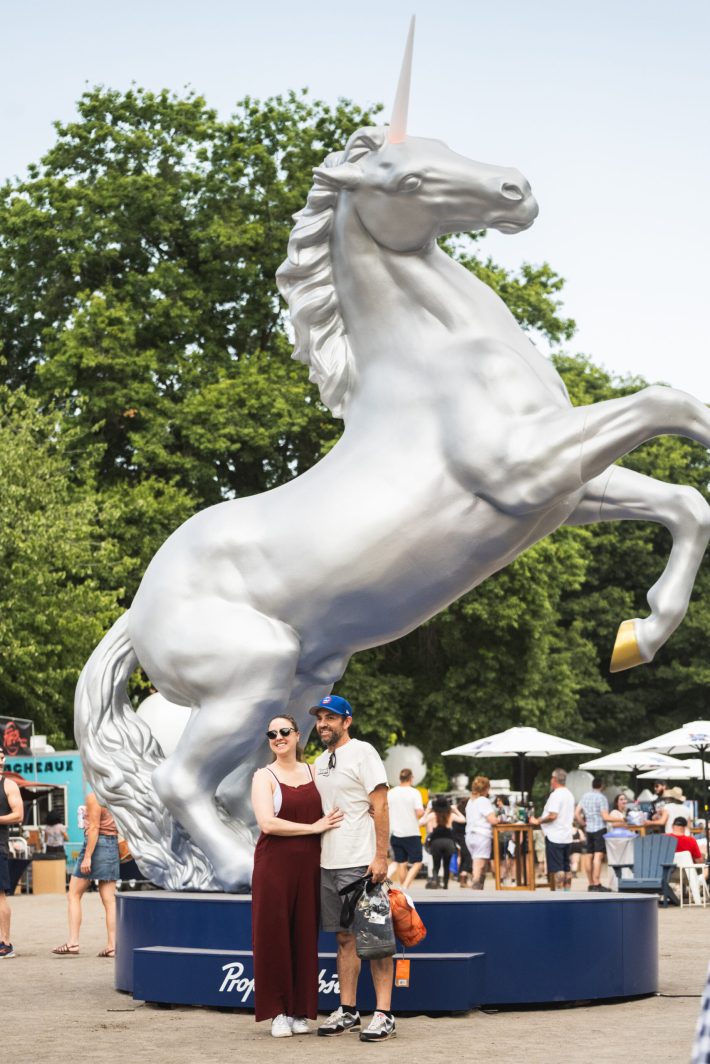
Dust is already kicking up around the unicorn statue as I begin to make my way down the field. I purchase my first PBR of the day, which is $5 for a 16 oz tallboy. 24 oz cans are $7, and aluminum bottles of water are $2. Not bad. I swing by the merch tent, where the staff manage to keep lines relatively short all weekend. Crowd fits favor black shirts, jorts, Blazers gear, and see-through backpacks.
The second act of the day is dancey post-punk outfit Home Front. Frontman Graeme McKinnon has a stage presence that is a mix of genuine guy-in-a-hardcore-band rowdiness and goofy, over-the-top punk swagger. He's punching the air, popping the collar of his jacket, and doing high kicks. The synth/auxiliary percussion player is similarly effusive, bouncing around behind the keys and punctuating lines with fist pumps and head nods. There's also a guy on stage wearing sunglasses with his arm in a sling whose only job appears to be backup vocals. They kick ass.
By 1:45, the sky is transitioning from slightly overcast to full sun. It won't get much above the mid-'80s all day. I'm finding a shady spot to reapply sunscreen (I'm just coming off of a stupid self-inflicted sunburn I got while running), but La Luz sound great even from far away. Their three-part harmonies are unbelievable. They're cheerful, chatting with the crowd between songs. "We woke up in Chicago," one singer says with a laugh. "It was a real surprise when we realized what time we were playing today. There was one flight that could have gotten us here in time…and we caught it!"
Dehd put on a great set, which I wrote more about here, and the day enters a peaceful lull, where everyone seemed to be taking a break. I bum a cigarette from two kind women under a shade tent and arrive at Shannon And The Clams for a set full of cute Buddy Holly/'60s girl group throwback pop blended with garage psych and rockabilly.
STRFKR and Gossip provide two dancey options that, to my surprise, seem to keep everyone's energy up. Usually the dinner hour is a real lull in the day, but there is a maintained collective enthusiasm that builds substantially when the Violent Femmes take the stage. I've recently been thinking about how, as a kid, I'd turn my nose up at stadium shows and nostalgia-bait reunion tours for over-the-hill rock stars and what have you, but now, I feel increasingly grateful to get to see legendary musicians while they're still active and performing. I'm not here for every 20-year album anniversary tour, and some acts like the Lemonheads feel so depressing (for obvious reasons) that seeing them in this era could only bum me out. But seeing a band like the Violent Femmes rip into their catalog of stone-cold classics is electrifying. They're still capable of putting on a great show, and it feels like a really lucky pull that Project Pabst got them this year.
Then it's time for another legacy artist whose catalog will certainly prove to stand the test of time: T-Pain. This is probably the most packed I've seen the festival for any set, and the mood is nearly euphoric. It feels like there's been a quiet reevaluation of T-Pain's music, which has gone from being viewed as a nostalgic but dated product of its era to what it actually is: some of the most influential and important rap music of the 2000s. Headliner Billy Idol rocks a lot harder than I expected, but everything after T-Pain is a post-credits sequence. The rappa ternt sanga is the evening's star.
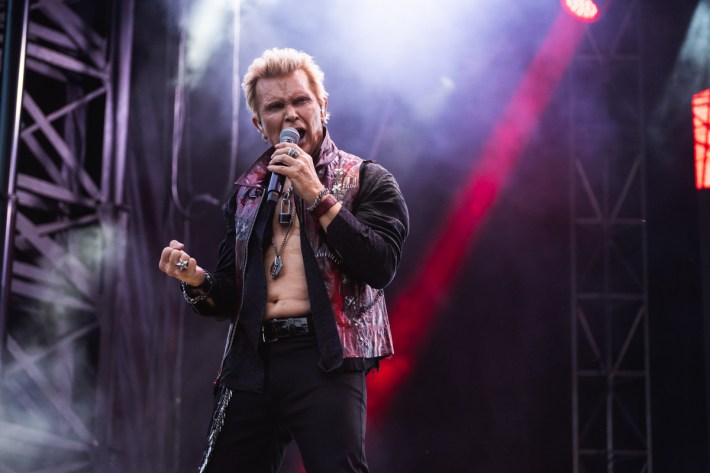
Day 2
Project Pabst day two dawns and, despite having only had a handful of PBRs the night before, it's still more PBRs than I usually have these days, so I'm working on shaking a mild hangover. (Your 30s are the most beautiful time in your life for everything except for drinking.) I make it to Bakeshop for the best almond croissant in Portland (and I've had a ton of them) before arriving at Waterfront Park at 1PM.
Glitterfox are today's opening event. Like Alien Boy, they're a Portland band, and despite being a relatively new band, they have a list of PNW bonafides: They're on Kill Rock Stars, and Chris Funk of the Decemberists produced their new record. They seem in great spirits despite a crowd that has not yet filled in. Today, a handful of people have begun posting up on the sidewalk between the fence and the river, enjoying the free, limited line of sight version of the festival.
The band cheerfully engages with the outside viewers: "Hey y'all over by the water, we're from here! We're Glitterfox! That's our name up there! We're posting on TikTok now! To make people happy…who we won't name." Presumably, they're doing the "Our label makes us do this" bit that still seems to be successful engagement bait on social media. There's a walkway about six feet wide formed with metal barriers that leads from the stage to the sound/video tent. Lead singer Solange Igoa descends into this walkway to ham it up during the last song, getting up close and personal to sing along with the audience members who know the words.
I poke my head into the bar tent, where they turn out to also have crates of records for sale. I don't know what I'd do all day with vinyl if I bought it, so I don't crate dig, although the impulse is still strong. Heading toward the Captain Pabst stage for Sweeping Promises, I clock for the first time that the outdoor bar area is called the "El Jimador Flavor Zone."
Sweeping Promises immediately win the crowd over. Their stabby, catchy post-punk is an easy sell, and people begin congregating. "We would like to dedicate this next song to the people of Palestine," singer Lira Mondal says in an introduction to "Cross Me Out." "Cross me out of history/ The taste of my memory/ It will surely fade from your mouth/ As you move on up, you'll cross me out," she sings with unwavering intensity. I stay on the move for much of the day, so I miss the very beginning and end of some sets, but as far as I hear, Sweeping Promises are the only band to mention Palestine by name. Their set rules; it gets people dancing.
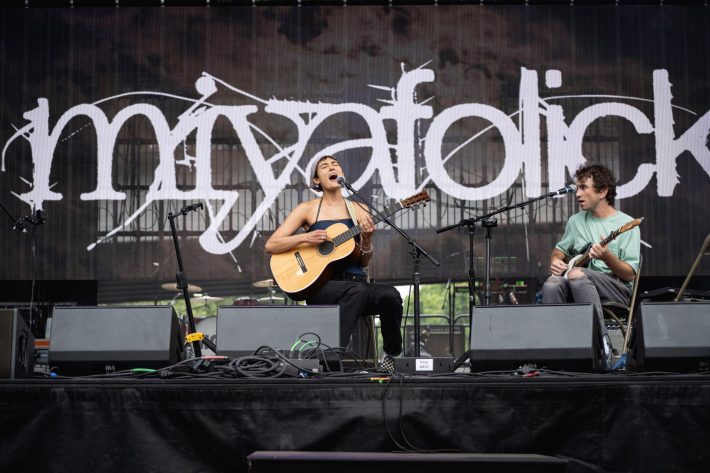
I catch part of Miya Folick's performance. She plays an open-tuned acoustic guitar next to an electric guitarist providing backing vocals, both of them seated in chairs on the stage. Once again, the breezy part of the day is giving way to sun. Folick polls the audience to see if she should take off her sweater: "It's like my security blanket, I wear it all day long, I wear it to bed. I'm the kind of person who sleeps fully clothed." The songs are very pretty, and I make a note to look up her music when I get home.
Kenny Mason starts five minutes late, but he more than makes up for it in the energy he brings."Y'all probably only on your first or second beer," the genre-blending rapper says, "but my job is to turn you the fuck up. We're gonna work together."
The festival crowd is a little thinner today than yesterday, but the growing congregation here seems high-energy, and Mason manages to really get his audience moving. "Make some noise for yourself one time," he says more than once. He's both a great performer and a great rapper. Later, he says, "Let me hear you scream if you smoke from time to time." After the approving crowd response, he says, "Let me hear you scream if you smoke a little more than time to time." The cheers are louder the second time.
By 3PM I have already counted five Jeff Rosenstock shirts. The Militarie Gun set is when the festival grounds start to feel like they're really filling up; more on that here. I see someone in the crowd in a Sugarpine corduroy hat and a So It Goes tattoo, which feels archetypally Portland.
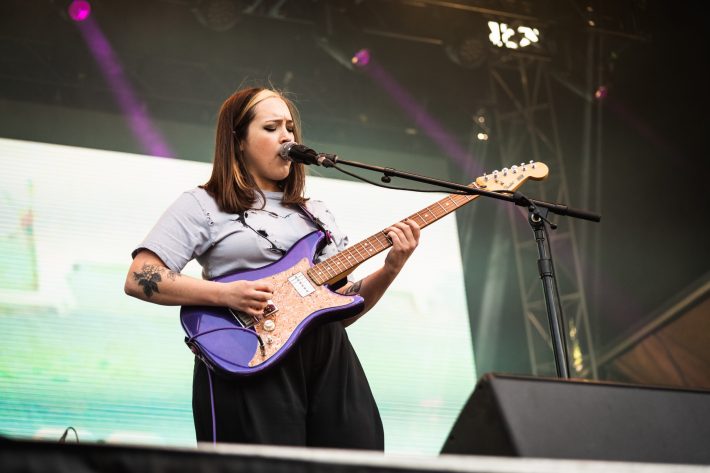
I bum another cig near the port-a-potties and ask the two people I'm standing with who they're most excited to see. Soccer Mommy, who's up next, is the first name from both of them. They've got a large and enthusiastic crowd. They're playing as a five-piece with three guitars, one of them a twelve string, and most of the band is wearing sunglasses. Soccer Mommy have spent the last several years becoming a fully evolved, surgically precise version of themselves. I saw an early iteration of the band in 2018 open for Stephen Malkmus And The Jicks at the Star Theater. Sophie Allison had X's on her hands and spent the evening chain smoking by the merch table. She was really nice. That show had almost nothing in common with this one, however: It's clear that they're fully comfortable being a big room band now, and they sound calm and confident.
At 4:30, I attend a "media mixer," which means everyone there with a press pass or a camera gets free drinks for an hour. We watch Jeff Rosenstock, who is kicking ass. He's unrelenting — I have no idea how he is able to expend this much energy in every set, but we as the audience are better off for it. The crowd has swelled around his stage.
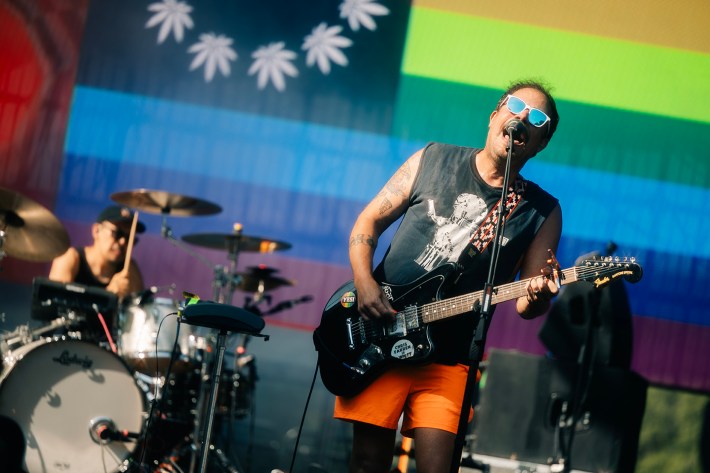
Manchester Orchestra went from being a Christian-rock-adjacent indie band to being a full on radio rock band to scoring films, and at this point, it's hard to tell if they're bringing new people into the fold or just have an extremely dedicated fanbase who continue to follow them through their career. In either case, it's impressive how much fervor they inspire. A lot of people I spoke to throughout the day were familiar with the name Manchester Orchestra but not the music; either I spoke to the wrong people or they were quick converts because the crowd is ecstatic.
I've seen this band a lot. They've been a good rock band for a decade. But even I'm surprised by their ability to pull in an entire field with nothing more than one big riff. There's almost no stage banter, just a clean, dynamic performance that feels pitch perfect. Whenever lead singer Andy Hull riffs on a melody or punches up his delivery, it's clear he's got a ton of range.
"TURN THAT SHIT UP PORTLAND" is the first thing I hear from Denzel Curry, and his set doesn't let up for a moment. It's rowdy, it's incredibly loud, and he and his DJ are giving out as much energy as the crowd is giving back to him. There's a wave of bouncing bodies. He plays "Threatz," a song that means more to me (a former Florida resident) than I can possibly express in this space. It rules.
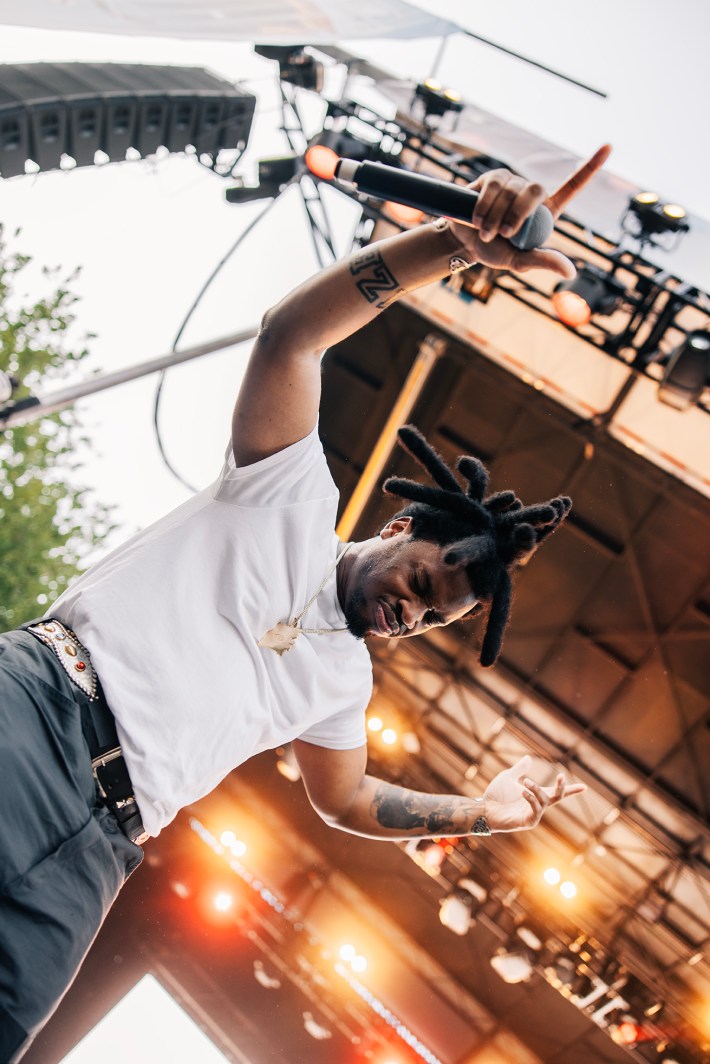
The Big Thief set is what everyone has been waiting for. I bump into my friend John, who has somehow smuggled his way into the festival just in time for Big Thief, and I realize that the crowd feels like it's still growing somehow. For the first time today, people are aggressively jockeying for space. This is also the first time all day I would describe the collective mood as "reverent."
Big Thief have gone from beloved indie band to, like, the biggest indie band. You don't have to be a Pitchfork reader to be really into Big Thief these days. They've slowly grown and grown and suddenly they're everywhere — deservedly, I should add.
Recently, the band's bass player left under hazy circumstances (that feel easy to suss out with context clues, but that's neither here nor there). Tonight, for the first time, the band is joined by Brooklyn musician Justin Felton, who records solo music under the name Strugglin', and a second drummer, Jon Nellon. There's huge applause as the band takes the stage, which quickly dies down into respectful quiet as the band gets off to a soft start. Two songs in, I start to wonder how well I really know the band's material. I can't name a song yet.
Turns out, nobody can. The first eight songs they play are unreleased. Of those eight, only one has been performed live before.
Ultimately, they play three released songs: "Dragon New Warm Mountain I Believe In You," "Masterpiece," and "Not." I hear rumors that two others, including "Certainty," were on the setlist but got skipped. In short: Big Thief's performance is very good, as expected, and their new songs continue in the vein of warm, jammy material that continues expanding the edges of the gentle folk at the heart of their catalog. Adrienne Lenker is, perhaps tellingly, wearing a Grateful Dead shirt. I'm less impressed by the jammier nature of some of the material. There's something hammy and unselfconscious about jam bands that is key to why it all feels so free. Even if you don't like it, even though the fans are cultishly obsessive, even if you don't know the songs, jam culture that is ultimately very accessible. There's no barrier to entry. Show up at a show, consume a substance, bask, rinse, repeat.
Big Thief are, first and foremost, a self-conscious band. This is not a bad thing – many of our greatest musical minds, from Brian Wilson to Billy Joel, have been locked in their mind-prison in one way or another. But Big Thief are not "loose" in the traditional sense. They are constantly working on creating A Big Thief Song. They are managing the Big Thief lore and legacy at all times, the way any confident and painstaking artist does. They are tuned into fan response. I don't think their vibe is incompatible with jamming, it's just aesthetically at odds with jam band communities, which revel in goofiness, hamminess, and showy virtuosity. Big Thief are much more restrained in their attitude, quiet and focused on stage. Their hippy vibe feels tied to heavy, sincere emotionality.
The new material roams, it meanders, it gives itself all kinds of room to ebb and flow and build. I think several of the new songs are really good, possibly some of their best material. The stuff that I don't love, however, feels a little sweaty, a little labored over, slightly overworked but undercooked. Lenker obsessively walks back and forth from her amp to her mic, making countless infinitesimal adjustments to the knobs and her amp and her guitar. Most people chalk this all up to playing new music with a new lineup, and I think that's fair.
It's obviously very baller to be the headliner of a festival and play over 75% brand new material. Responses online will turn out to be more enthusiastic than I expected – people are really hungry for new Big Thief music no matter how prolific Lenker is (and she's pretty damn prolific). I know at least two or three of those songs are going to shoot right to the top of my Big Thief rankings. It feels a little alienating to be subjected to a set of unnamed songs that got no introduction at all. But it barely even matters. The greatest testament to the band's power at this point in their career is that the overwhelming majority of that festival crowd stands there for over an hour listening to music they'd never heard before, eager and grateful just to soak in the performance. On this night, Big Thief might as well be the biggest band in the world. They certainly feel like the most important.
